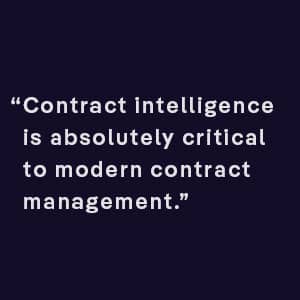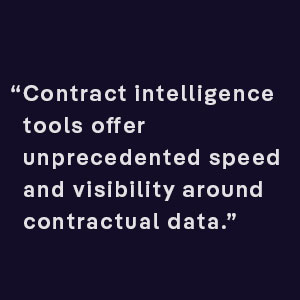When it comes to contract lifecycle management (CLM) software, there is a big difference between the bare minimum and the most reliable solutions. A platform that does not have advanced digital tools, for example, necessitates a more manual contract review process. This means uploading and sorting individual documents, entering contractual data, and tracking contract performance, as well as staying on top of deadlines. A platform with artificial intelligence (AI), on the other hand, automates and streamlines the menial tasks tied to contract management. It provides valuable contractual insights, allowing legal and other professionals to read contract analysis and develop business strategies.
The latter approach to CLM is known as “contract intelligence” because it uses AI, and combines deep and active learning. This means that the AI is pre-trained on thousands — if not millions — of agreements and variations on clauses. It can then search through a company’s portfolio, identifying standard fields and provisions, and determining how many contracts contain standard language and how many renewal deadlines are coming up. And the more information is fed into the contract management system (CMS), the more insights it generates for legal teams, contract services, and the rest of the organizations.
In other words, contract intelligence is absolutely critical to modern contract management.
Why is Contract Intelligence Important to Your Organization?
These days, there are many challenges associated with outdated contract management platforms: the volume of complex contracts is too large for accurate tracking and there is a lack of a centralized repository or single source of truth, not to mention there are inconsistencies with contract language, terms, and clauses. According to Harvard Business Review, these particular challenges can result in inefficient contracting processes, which can lead companies to lose between 5 percent and 40 percent of value on deals.
There are also risks associated with older contract management processes, including uncertain roles and responsibilities; unwanted termination or rollover of agreements; breach of contract due to unmet obligations; and missed dates and deadlines altogether.
Naturally, contracts will always come with challenges and inherent risks. But much of these can be overcome and mitigated with contract intelligence.
Can AI Tools Read and Interpret Contracts?
Although contract intelligence tools cannot read and interpret agreements, machine learning does extract contractual text and transform this information into various data points. It then analyzes the patterns of the data, before making accurate predictions based on the same.
Contract Intelligence Versus Traditional Contract Management
CLM software leverages electronic signatures and digital storage to execute contracts more quickly. However, they cannot provide the data extraction that is needed to make business decisions. This is where contract intelligence stands apart from CLM software. It uses the power of AI to provide unlimited visibility into agreements, converting rather stationary contracts into fairly valuable business assets.
Here are the main differences between traditional contact management and contract intelligence.
Traditional Contract Management
- Digitizes and stores agreements in a centralized location
- Offers templates and clause libraries, helping to standardize buy- and sell-side contracts
- Automates workflows around contract creation and execution
- Increases in volume as new contracts are added to the system
Contract Intelligence
- Uses advanced functionality to structure agreements and speed up contracting processes
- Brings together obligations and other important data within the contract management system
- Ensures agreements are in compliance and commitments are upheld throughout contracts
- Increases in value by generating unique contract insights with each new deal
Specific Benefits of Contract Intelligence
As noted above, contract intelligence tools offer unprecedented speed and visibility around contractual data. They allow legal and other departments to meet customer expectations and strengthen key relationships, as well as focus on higher-level, strategic work.
More specifically, contract intelligence offers the following benefits:
Increase Productivity
Handle a greater number of contracts and other legal documents, while focusing on higher-value tasks.
Improve Quality
Through an auditable process and quality assurance workflows, reduce human error while measuring and improving contracting quality and accuracy.
Reduce Cost
Automate and streamline contract management-related tasks, and speed up contract analysis — all while reducing contracting costs.
Reduce Risk
Be confident and rest comfortably in business decisions, knowing that all vital contract information has been assessed properly and contract-related risks have been mitigated.
Perform Better
To ensure quick, informed responses to changing situations and better performance, retain and share all extracted contract intelligence.
Contract Intelligence Use Cases
Generally speaking, legal and other departments need to extract, analyze, and act on relevant information contained in their agreements. The good news is that contract intelligence automates and streamlines all of these processes, as shown throughout this brief. And by leveraging powerful AI technology, and using machine learning and natural language processing, it makes certain that the entire system grows more intelligent and becomes quicker, as it absorbs more contractual information.
Here are just a few use cases for contract intelligence today.
Contract Due Diligence
With extracted contract intelligence, companies can not only expedite contract portfolios and high-risk documents, but also produce insights, populate reports, and guide negotiations.
Statutory Audit
Organizations can also gain valuable insights to improve audit coverage and quality while increasing productivity. All this by using AI to identify and extract information from agreements.
Compliance Review
By automating the extraction of key provisions, companies can increase their overall efficiency around compliance review. They can increase the scope and improve the quality of such reviews, allowing the business to avoid risks and take full advantage of opportunities.
Repapering
Organizations are also empowered by contract intelligence when it comes to managing business risks. With accurate, reliable contractual data that facilitates remediation efforts, their senior leaders can make well-informed decisions for their departments and the enterprise.
ContractPodAi Cloud is also built on a foundation of contract intelligence. Our Legal DeepSights feature combines full end-to-end contract lifecycle management (CLM) with AI-based analytics. These advanced tools help legal and other teams track all the contractual details and gain unique insights from agreements — to provide transparent reporting for key stakeholders, anticipate bottlenecks, and make better business decisions.
If you want to learn more about adopting contract intelligence, download our Legal DeepSights data sheet. Or contact ContractPodAi today and schedule a demo.
Author:

Sarvarth Misra
Connect with us on Linkedin





